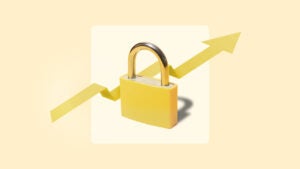Ask Bankrate: Questions about affording a new house, maximizing savings, RMDs and more

Ask Bankrate is a recurring feature where Bankrate’s experts answer your financial questions. Visit this page for more information on how to submit your question. Click on a question here to jump straight to it.
Questions:
- I have a CD maturing. Should I put it into savings?
- Is now a good time to look for a new savings account?
- Should I lock in a CD or keep money liquid?
- Can I afford to buy a home?
- Why aren’t mortgage rates even lower?
- Will banks accept unemployment comp as a form of income?
- Can you reverse a required distribution from inherited IRA?
- How can I maximize my savings?
Q1: I have a CD maturing. Should I put it into savings?
I have some CDs that are almost eligible for rollover. Should I move the money into a savings account and wait to see if the CD interest rates go back up when the economic situation clarifies?
— David W.
Answered by Matthew Goldberg, banking reporter: “First off, determine the purpose of the money and when you’ll need it. This will help you choose an option that fits your savings plan.
CDs generally have early withdrawal penalties, so you’ll want to carefully determine your time horizon for this money. However, a no-penalty CD is a way to earn a fixed APY without the risk of paying a penalty if there’s an unexpected need.
Short-term CDs are a way to earn a fixed annual percentage yield (APY) and evaluate rates in a year. Focusing on current competitive savings and short-term CD yields is probably better than trying to predict the future rate environment during unprecedented times.
Make sure the CD is at a Federal Deposit Insurance Corp. (FDIC) bank and within FDIC guidelines and limits. The standard deposit insurance amount is $250,000 per depositor, per FDIC-insured bank, per ownership category.”
Q2: Is now a good time to look for a new savings account?
I am newly graduated and have been trying to get my finances in a good place. I was in the process of finding a good high-yield savings account when the APYs started going down due to the virus. Should I still be looking for a bank to use and be locked into a lower yield? Or should I wait it out and wait until the yields start going back up?
— Megan B.
Answered by Matthew Goldberg, banking reporter: “Generally, savings account yields are variable. The exception to this is introductory annual percentage yields (APYs), which are fixed for a certain period. So a savings account or money market account usually won’t have a fixed APY.
Compare current APYs now and then you can always evaluate the savings climate in the future. The worst-case scenario is that you could switch banks at that time if you’re unhappy with the APY.”
Q3: Should I lock in a CD or keep money liquid?
With interest rates decreasing is it advisable to open a six-month CD as opposed to a year, or lock into one a year or more based on considerations that the economy won’t undergo an upward trend until 2022, keeping interest rates low until then. In other words, is it best to keep your money liquid during these times?
— Pam B.
Answered by Amanda Dixon, senior banking reporter: “Keeping some money liquid for emergencies (to cover a minimum of three to six months of expenses, or ideally at least six months of expenses) is wise. How you invest the rest of your funds should depend on your financial goals.
As you mentioned, given the rate environment we’re currently in, it’s best to go with a CD with a shorter term length. A six-month CD won’t help much these days. Online savings accounts are more liquid and pay higher yields.
A one-year CD could be a good option, but it depends on how soon you’ll need access to the money. Building a CD ladder (buying multiple CDs at once that mature at different times) may also help. That way, you’ll routinely have access to liquid cash and can take advantage of CDs with higher yields maturing over time.”
Q4: Can I afford to buy a home?
I am interested in buying my first new home. I’m not sure where to begin or if I can afford or qualify for a mortgage.
— Charles P.
Answered by senior mortgage reporter Jeff Ostrowski: “Such a simple question, such a complicated answer. The first things to consider are why you want to buy and how long you plan to be in the home. A general rule of thumb is that, for a property purchase to make financial sense, you need to own the place for three to five years. That’s because when you buy or sell a home, you’ll absorb transaction costs totaling thousands of dollars or even tens of thousands. (Read Bankrate’s guide to the rent-or-buy decision.)
Assuming you’re not expecting to move across the country in two or three years, the next question is how your income compares to housing costs in your area. If you’re in a low-cost market like Cleveland or Detroit, you’ll find homes available for less than $150,000. If you’re shopping in a pricey place like Northern California or New York City, good luck finding a home for less than $1 million. That’s a huge spread, obviously, so you need to know how your financial picture compares to your metro area’s housing costs.
Next up is your income. Mortgage lenders favor borrowers with regular paychecks; if you’re self-employed or run a business, qualifying for a loan gets tougher. You’ll also need to know your credit score — the higher the better, but the Federal Housing Administration (FHA) makes loans to borrowers with less-than-stellar credit. Next up is how much cash you have for a down payment. Amid the coronavirus pandemic, some lenders are requiring 20 percent down, although FHA loans are available with down payments of as little as 3.5 percent.
As for how much you can afford, in general, try to limit your monthly payment to about a quarter to a third of your monthly income — if you’re in an expensive real estate market, the percentage will be higher. Bankrate’s mortgage calculator will help guide you through those numbers.
A mortgage broker or loan officer should be able to look at your finances and explain the basics of how much you can borrow. See Bankrate’s guide to finding a lender. Good luck. Buying a house is a big step, but one that’s generally worth the effort.”
Q5: Why aren’t mortgage rates even lower?
With zero and negative federal bank interest rates, along with the decline in mortgage applications and real estate sales, I would expect mortgage rates to be moving significantly lower — but they are not.
Are the banks taking advantage of this low-interest situation to pad their margins and profits, and not passing these savings on to customers who actually need the reduced rates?
— Dan K.
Answered by Natalie Campisi, senior mortgage reporter: “This is a common question and one that makes sense, especially in today’s environment where people are looking to save money wherever they can. Mortgage interest rates move up and down every day and are determined by many economic indicators — from unemployment rates to inflation.
The Federal Reserve has no influence on fixed-rate mortgage rates; their decisions affect short-term loans (such as credit card debt and adjustable-rate mortgages). The 10-year Treasury note is typically a bellwether of where mortgage rates are headed.
So, rising rates are not the result of banks being greedy or trying to shortchange borrowers, instead rates are truly a product of the economic environment. It’s not a science and, as you’ll notice, different lenders have different rates. Some lenders might be less risk-averse and therefore will offer lower rates to attract business.
Borrowers, however, can influence the mortgage interest rate they get in two ways: with their credit score and how big their down payment is which affects their loan-to-value ratio, or LTV. Excellent credit scores (above 740) get the lowest rates, so be sure to check your FICO score before you apply for a purchase mortgage or refinance.
The LTV is the amount borrowed compared with the purchase price. The higher the LTV the more risk your lender will incur, which might translate into a higher interest rate.”
Q6: Will banks accept unemployment comp as a form of income?
I am looking to refinance my home mortgage. My question is: Will banks and credit unions accept unemployment compensation as a form of income while I am temporarily laid off because of the coronavirus?
— Dan D.
Answered by Natalie Campisi, senior mortgage reporter: “Typically, being unemployed makes it tough to get approved for a mortgage refinance. However, it’s not impossible. Some lenders will use unemployment insurance as proof of income if you’re a seasonal worker, such as construction workers or people in the entertainment industry. If you can demonstrate a pattern of work, even if it’s not consecutive months, some lenders will approve the loan.
In the case of a temporary layoff due to the coronavirus, the lenders we spoke to said they wouldn’t be able to use unemployment insurance as proof of income.”
Q7: Can you reverse a required distribution from an inherited IRA?
The legislation recently passed suspends the requirement to take the required minimum distributions from IRA accounts for 2020. However, there is no provision to reverse a previously taken required distribution to an inherited IRA. What can be done to reverse the transaction done earlier in the year prior to the passage of this legislation?
— Saypi
(Editor’s note: Since this answer was published, the IRS issued a new ruling that extends the deadline for putting distributions back into a retirement account. Read Bankrate’s article on the IRS extending RMD relief for retirees.)
Answered by Stephen Kates, CFP: “The recently passed CARES Act, which suspended required minimum distributions (RMDs), had very specific stipulations on how this suspension should help owners of retirement plans. The new rules apply to any defined contribution plan which includes 401(k)s, 403(b)s, 457(b) plans and IRAs (including inherited IRAs). The new CARES Act allows you to skip 2020 completely if you have not yet taken your distribution. Unlike normal IRA RMDs, you are unable to take advantage of the 60-day rollover provision that allows money movement between normal IRAs, which would be the best way to “undo” a normal RMD distribution if you have taken it in the past 60 days. Unfortunately, unless the IRS updates these rules with special guidance on undoing Inherited IRA distributions in 2020, all distributions will be final and irreversible.
Please do not give up hope, however. In an April 16 article on RMDs, Forbes quoted an IRS spokesperson who said, “We anticipate issuing formal guidance addressing both the CARES Act suspension of the RMD rules for 2020, as well as last December’s tax law change, moving the age for starting required minimum distributions from 70.5 to 72.”
It is possible that there may be the chance to undo this distribution in the future but there is no guarantee.”
Q8: How can I maximize my savings?
How can I make the most of my savings?
— Jason Y.
Answered by Matthew Goldberg, banking reporter: “First off, determine what this money is being saved for and when you’ll need it. Then make sure you have at least six months of emergency savings. This should be in a savings account so it’s easily accessible. Your emergency fund should earn a high yield, be kept in a safe place and be in a liquid account. A high-yield savings account at a Federal Deposit Insurance Corp. (FDIC) bank checks all those boxes. Always confirm the bank is FDIC-insured and that your money is within FDIC limits and guidelines.
If you have an adequate emergency fund, apply some additional funds toward any high-interest debt. If you’re debt-free, consider a CD. With a CD, you might earn a higher yield than a savings account on longer-term money. But because of early withdrawal penalties, make sure you won’t need this money during the CD’s term. An easy way to do this is align the CD with a future goal. A no-penalty CD could be a good option if you have an uncertain timeline for the money.”
Why we ask for feedback Your feedback helps us improve our content and services. It takes less than a minute to complete.
Your responses are anonymous and will only be used for improving our website.
You may also like

How to choose a mortgage lender: 5 tips

Questions to ask a mortgage lender

